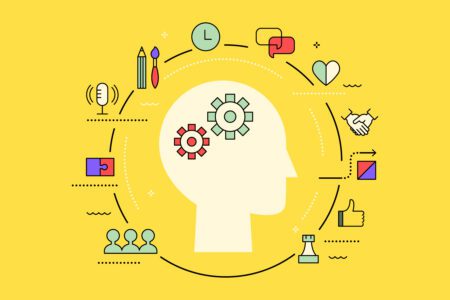Watch the interview on our Youtube channel, or listen to it on one of your favorite platforms:
Carolyn Hass Ph.D. thought leader, operations executive, and master leadership trainer
For any listeners that don’t know her, Carolyn is a thought leader and Operations executive in the HR technology space. At SuccessFinder, she handles the end-to-end product life, driving corporate strategy execution through the design and development of data-driven HRtech solutions.
She is also a master trainer and facilitator, building on extensive experience as a consultant, focusing on the topics of self-awareness for professional growth and leadership development.
What’s the role of psychometric assessments in the workplace?
- Part of the value of psychometric assessments is to capture elements of an individual that are difficult to observe directly
Those influence things like performance or other metrics that the organization cares about (productivity, engagement, etc.)
- Psychometric assessments also add an objective data source to an evaluation of an individual (multi-modal assessment) over other more bias-tinged methods.
You may feel like in an interview this person seemed more reliable than the other individual, but that may be your perception based on biased criteria that in fact are unrelated to how reliable they can truly be!
- Finally, psychometric assessments can also predict future outcomes based on the stability of the measure over time.
Assessments allow you to gather numerical data that can then be used to measure the degree of relationship between two variables. Example: you can study the relationship between the frequency of certain manager behaviors and the levels of engagement of their teams – you can quantify these relationships and find out how much a behavior truly influences and predicts others.
These are great ways to ensure you’re making decisions as an organization that are data-driven, accurate, and precise. Most importantly, psychometric assessments can take a lot of uncertainty and guesswork out of the equation.
What to look for when shopping for a psychometric assessment?
The strength of any such psychometric assessment, no matter what we want to know, can be measured by the degree to which its methods are objective, valid and reliable.
You want to also make sure the assessment is not easy to “fake”. What I mean by easy to “fake” is that many assessments are self-reporting and there are ways to answer in a way that makes you appear more favorably – or ways that items can be presented that may make it more obvious what is being asked.
To fight that, you’ll want to look for an assessment that has built-in measures against faking.
One other thing you want to look for is built-in measures that flag social desirability too. These measures will determine, generally, the degree of honesty, continuity, and disclosure an individual demonstrates during the assessment process.
It also depends on the level of precision you’re looking for; what you want to know.
When it comes to personality and behavioral styles, you may be tempted to go for a few simple indicators, which we call “type” indicators, that will classify an individual into one of 8 or 10 styles. These offer more simplified generalities about a persons’ style that are easy to interpret because the nuances are left out.
However, for something as complex as personality, and people in general (distinct, layered, human beings), personality “trait” type indicators can bring a lot more variance.
A simple analogy I like to use is a blood test versus a DNA test. Do you simply want to know if you’re an AB-type and what you can receive or to whom you can donate as blood? You will be categorized into a group that many other people belong to.
Or do you want a DNA test that can show genetic code at a specific level? Here, your DNA is unique and belongs only to you – we’re describing the unique combination of characteristics that make up who you are.
This analogy applies to psychometric assessments. What do you need to do with the information you’d like it to collect? Your answer to this question will determine the level of precision and accuracy you should be looking for.
There are some things you just can’t know with a less precise test – and you want to be very careful not to make over-generalizations or “read into” certain types where that precision just isn’t being captured by the test.
What makes SuccessFinder a great option?
Well, SuccessFinder definitely takes the approach that to maximize an individuals’ potential, you have to understand who they are and who they’re not – that means to appreciate and understand the nuances that make them unique. We don’t speak in generalities, we want to give you relevant information about an individuals’ style that can help them become aware of their unique strengths and blind spots. We also want to empower employers with these insights to better coach and develop their employees, develop future leaders, and also build stronger teams.
Our science is precise so that we can provide you with a depth of insight that adds incremental value.
This precision also allows us to uncover more accurate relationships between behavioral styles and key outcomes organizations care about – the relationship between certain traits and performance, the relationship between certain leadership behaviors and engagement, the relationship between certain team dynamics and productivity.
The more you can hone in on what makes a real difference, the more targeted and focused your organizational initiatives will be to make an impact on your people.
How does SuccessFinder impact the professional development of a workforce?
The SuccessFinder profile helps employees be more self-aware so they can:
- Take ownership of their strengths (the ones that come naturally) – lean into and leverage them more
- Identify step changes they want to make – based on where they’re going, role, context, team, there may be things that are already in their wheelhouse. Their SuccessFinder profile could help take their talent from good to great
- Identify areas that are less natural to them and see what it means to do these behaviors. Are they important for their success? Why are they more difficult or effortful for them, have they caused them difficulty in the past, etc.
These are also tools to make managers more effective in coaching and developing people in the right direction and feeling equipped to have those targeted and personalized conversations.
The last thing I’m also thinking about is how a SuccessFinder profile will help the organization target key behaviors they need in their workforce through data analytics that can be related to their strategy.
Follow our YouTube channel to watch all the interviews of our People Potential series. Every month, various experts will be brought on to discuss empowering individuals and organizations to achieve their full potential.
Our interviews are also available as podcasts, follow us on your favorite platforms:



